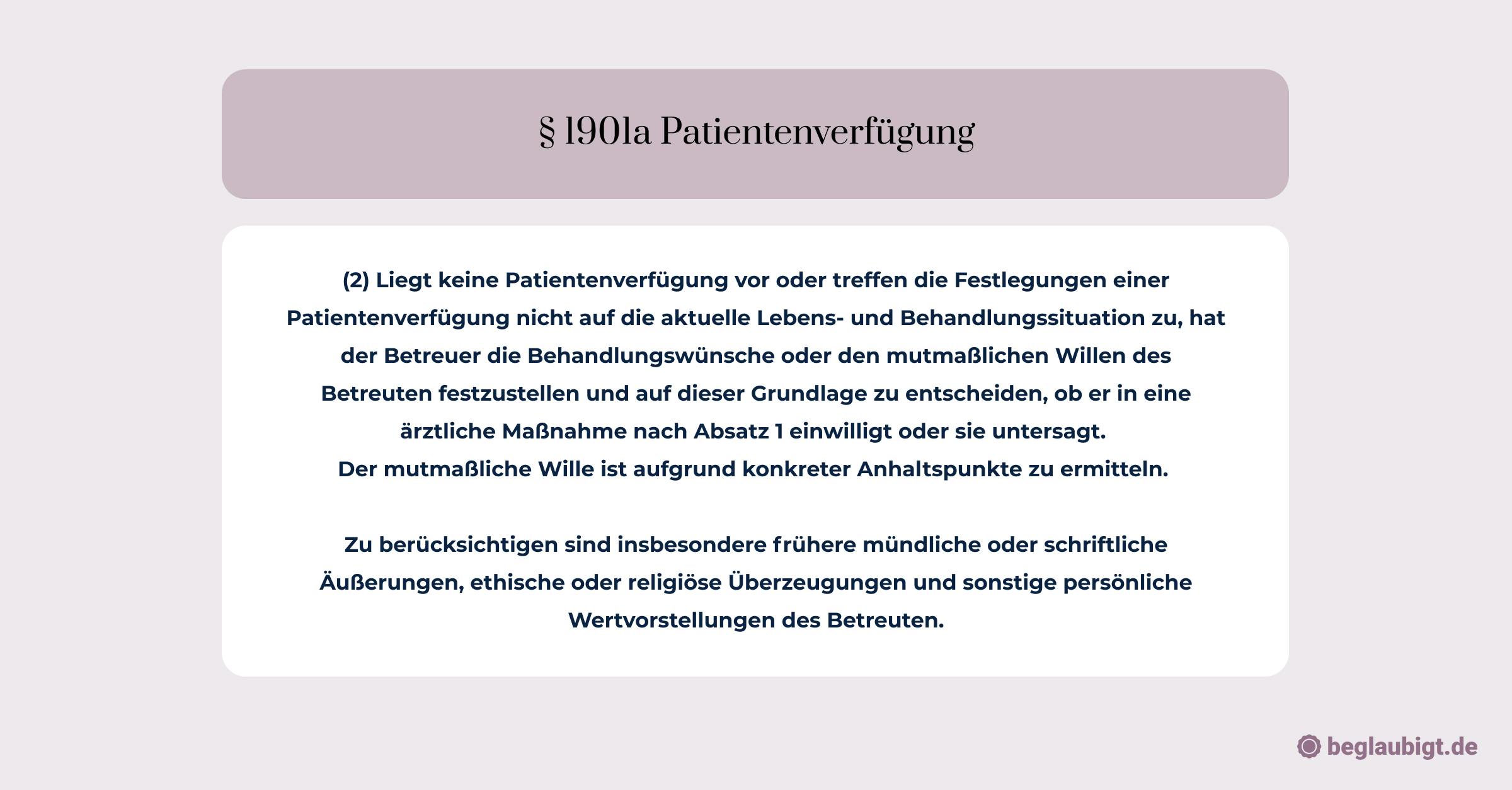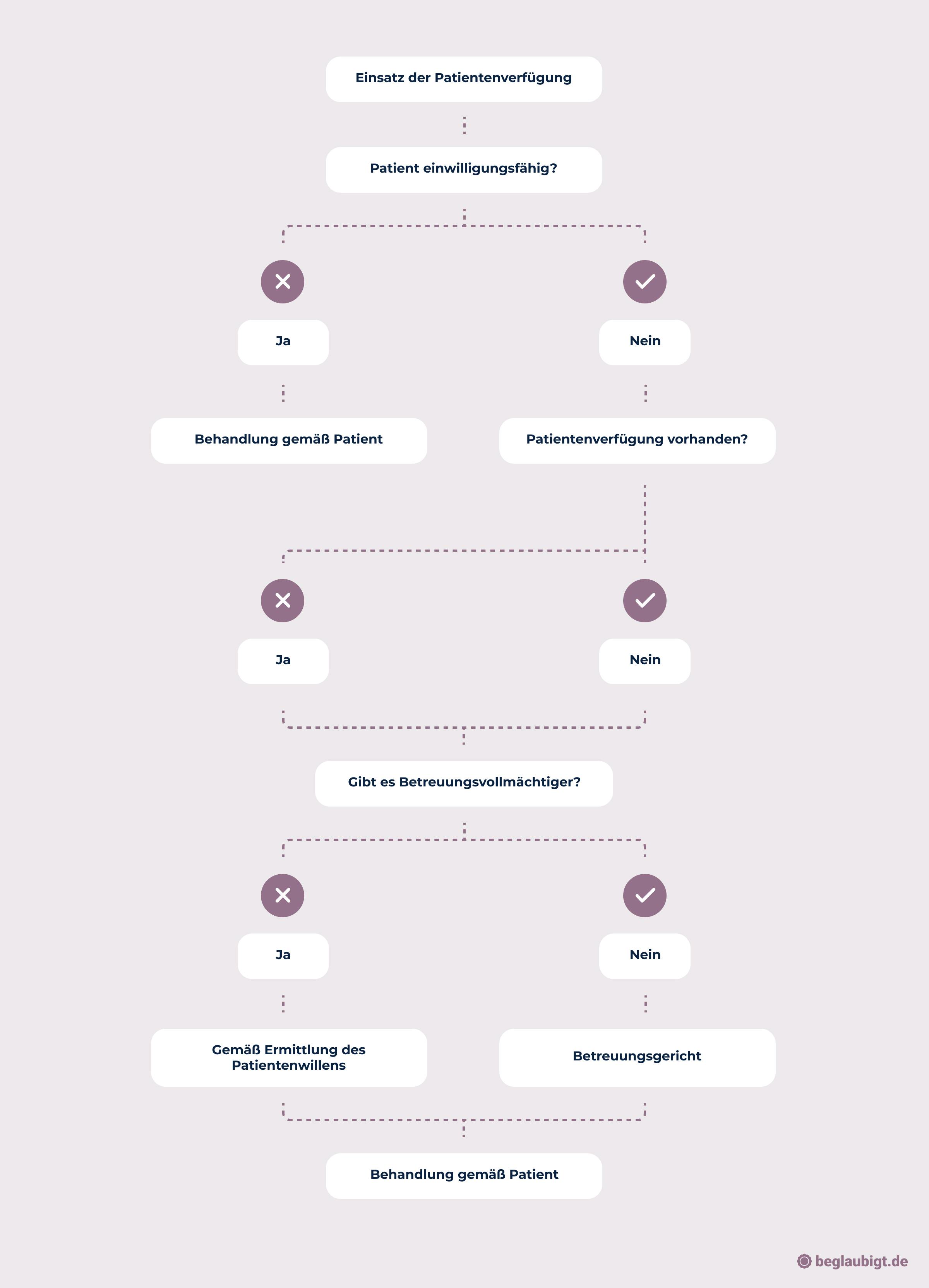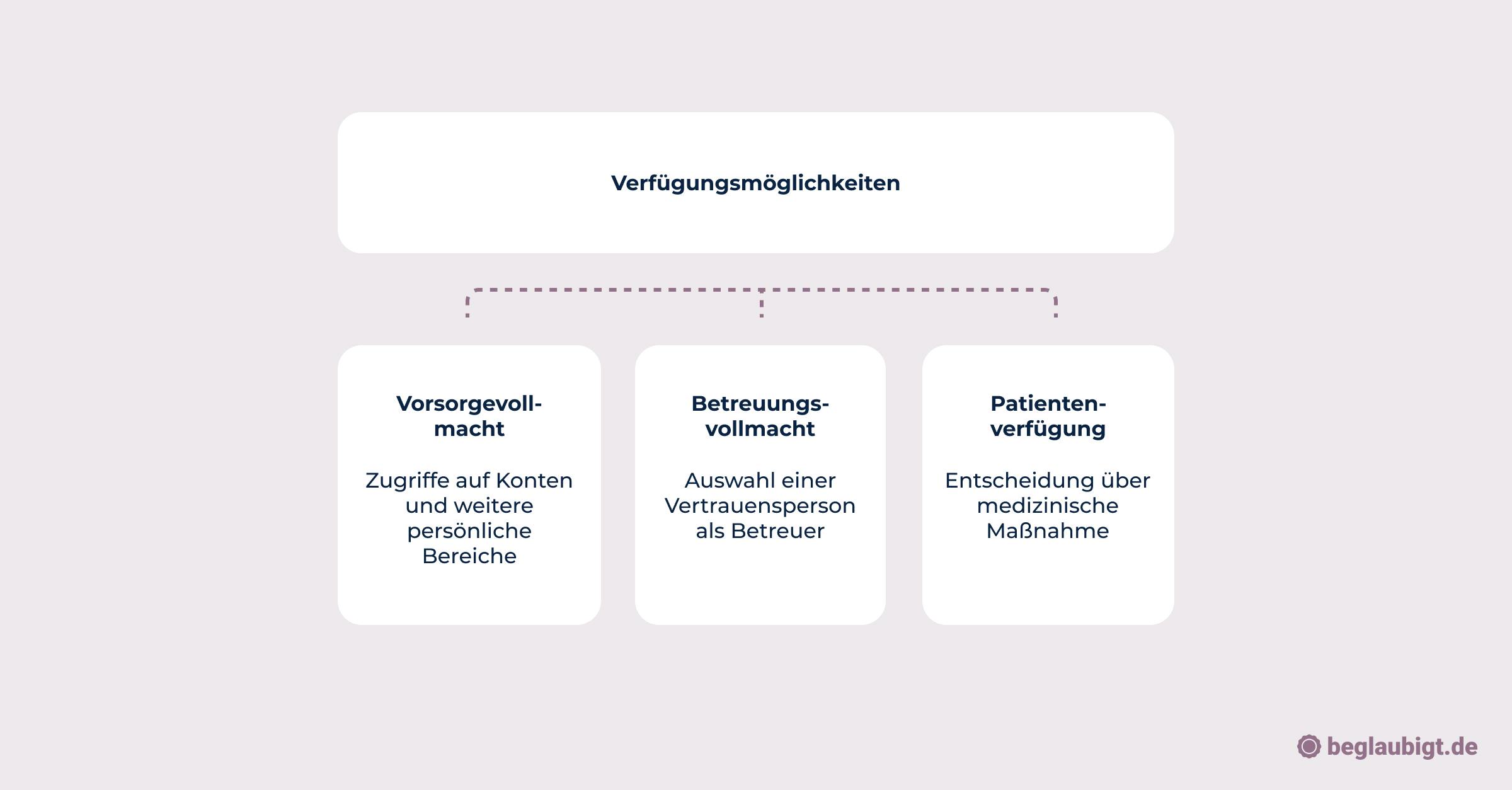No Living Will, Who Decides: Examples, Procedure & Legal Framework
A living will is an important precautionary measure that allows a person to make autonomous decisions about medical treatments in the event of serious illness or accident.
But what happens if no living will is in place? Who then makes the decisions, and based on what criteria? In this article, we explore who decides in the absence of a living will and which legal foundations and regulations apply.
We examine the role of a court-appointed guardian and the influence that family members may have, as well as the limits of decision-making authority. Let’s dive into the complex considerations involved in medical decision-making without a living will.

Who Decides if There is No Living Will: Can Family Members Make Decisions Without a Living Will?
In Germany, the right to self-determination is at the core of medical law. Every patient has the fundamental right to decide on medical treatments. This right remains valid even if the patient is no longer able to make conscious and independent decisions. The Federal Court of Justice (Bundesgerichtshof) reaffirmed this right to self-determination in 2010.
But who makes the decisions if there is no living will and the patient is unable to decide?
It is often assumed that in such cases, the next of kin, such as a spouse or children, automatically have decision-making authority. However, this is a misconception. Family members are not automatically entitled to make medical decisions.
In these situations, a case-by-case assessment is required. If there is no living will, medical decisions can be made depending on the circumstances by either a court-appointed guardian, a designated representative, or through a court approval process.
The courts have addressed this issue extensively in recent years. Notable decisions include those of the Federal Constitutional Court (Bundesverfassungsgericht) in 2017 and the Federal Court of Justice (Bundesgerichtshof) in 2018. These rulings clarified the rights and obligations of family members when no living will is present.
For this reason, it is highly advisable to create a living will early on to ensure that your wishes regarding medical care are respected. If there are uncertainties or legal questions, it is wise to consult a specialized medical law attorney.
Who Decides on Life-Sustaining Measures?
If neither a living will (Patientenverfügung) nor a durable power of attorney (Vorsorgevollmacht) is in place, and the patient is no longer capable of making decisions, the responsibility to decide on medical treatments typically falls to family members or a court-appointed guardian. The focus, however, remains on respecting the patient’s will.
To determine the presumed will of the patient, it is essential to rely on prior statements, behaviors, the patient’s general life situation, and their personal values. These factors help represent the patient’s wishes as accurately as possible in their absence.
However, in complex cases, disagreements may arise between family members or between family members and the guardian regarding the interpretation of the patient’s will. In such instances, the Guardianship Court (Betreuungsgericht) acts as a neutral authority to make decisions in the best interest of the patient. The court may also consult external experts to gain a more comprehensive understanding of the patient’s presumed will.
Particularly when it comes to life-sustaining measures, careful consideration is necessary. Medical perspectives—such as the potential for recovery or relief—must be weighed against the possible risks and burdens of the proposed interventions. Ultimately, it must be questioned whether the patient, if capable, would have wanted the suggested measures in such a situation.
To avoid such complex and emotionally charged scenarios, it is advisable to prepare a living will early on, ensuring that your preferences regarding medical care are clearly communicated.

What Happens in the Hospital Without a Living Will?
If no advance directive or durable power of attorney is in place and the patient is no longer able to make decisions, the responsibility typically falls on relatives or a legal guardian to decide which medical measures should be initiated or discontinued. However, if no relatives can be identified or reached, complications can arise.
In such cases, the attending doctors are obligated to initiate all medically necessary measures to save or maintain the patient's life until a decision can be made. These are considered emergency measures, but they should not result in the patient's will being ignored.
Therefore, it is important for everyone to create an advance directive and/or a durable power of attorney early on and regularly update it. This ensures that, in an emergency, their wishes and preferences are respected, avoiding conflicts between relatives or with the attending physicians.
The advance directive should also include specific instructions regarding emergency treatment and the handling of life-sustaining measures to ensure the clearest and most precise arrangements are in place.
What Does the Law Say?
The Federal Constitutional Court (Bundesverfassungsgericht) has repeatedly emphasized the importance of patient autonomy, affirming that every individual has the right to make decisions about their medical treatment.
In particular, the Federal Constitutional Court in its decision from June 17, 2010 (Az.: 2 BvR 882/09) highlighted the significance of living wills and durable powers of attorney for protecting patient self-determination.
This ruling underscores that, in the absence of a living will or power of attorney, doctors and hospitals are required to respect the patient's right to self-determination and make efforts to determine the patient’s presumed will. In cases of uncertainty, the Guardianship Court (Betreuungsgericht) can be involved to make a decision.
Are There Legal Regulations Governing Decision-Making Authority?
Yes, decision-making authority, especially in medical matters, is clearly regulated by law in Germany. These regulations are designed to protect the rights and well-being of individuals who, due to illness or disability, are unable to manage their own affairs.
Legal Foundations:
- German Civil Code (BGB): The relevant provisions are found in §§ 1901a to 1905 BGB. These sections cover the following:
- Living Will (Patientenverfügung): If a living will exists, it takes precedence over other decisions. In this document, a person can specify in advance which medical treatments they wish to accept or refuse in certain situations.
- Legal Guardianship: If no living will is in place and the person is incapacitated, a legal guardian (Betreuer) takes over decision-making. The guardian makes decisions based on the presumed will of the person in question.
- Authorized Family Members: If there is no legal guardian appointed, a family member or close relative often steps into this role. This person acts in the best interest of the incapacitated individual.
- Involvement of the Guardianship Court: If no suitable authorized person or guardian is available, the Guardianship Court (Betreuungsgericht) is responsible for appointing an appropriate guardian. This could be a private person or a professional guardian (Berufsbetreuer).
Given these regulations, it is of utmost importance to address the topic early on, so that decisions can be made swiftly and in the best interest of the person concerned in emergency situations. A living will can provide crucial clarity and support family members and guardians in their decision-making process.
Who Decides for Me if I’m in a Coma?
If you are in a coma and have not left a living will (Patientenverfügung), others will need to make decisions on your behalf. In principle, your wishes must still be respected, even if you can no longer express them yourself.
In Germany, this is governed by guardianship law (Betreuungsrecht), which determines who is appointed as a guardian if someone is unable to manage their own affairs. Typically, a close family member is appointed as a guardian if there is no durable power of attorney (Vorsorgevollmacht) or guardianship directive (Betreuungsverfügung).
The appointed guardian, in consultation with the treating doctors, makes decisions that are in the patient's best interest and reflect their presumed will. If there are disputes among family members or doubts about the guardian’s decision, the court may be involved.
5 Court Rulings Where No Living Will Was Present:
- Federal Court of Justice (BGH) Ruling, July 6, 2016 (Az.: XII ZB 61/16):In this case, the BGH had to decide whether a patient who could no longer express herself and had not left a living will should continue to receive artificial nutrition. It was ruled that feeding could be stopped since the patient had survived several weeks without food or water, and no improvement in her condition was expected.
- Federal Constitutional Court Ruling, February 6, 2020 (Az.: 2 BvR 2347/15):This case concerned whether a guardian could authorize placement in a nursing home without the consent of the patient. The court decided that such placement without the patient's consent was allowed if the patient was incapable of giving consent due to illness and no less restrictive alternatives were available.
- Higher Regional Court of Hamm Ruling, September 12, 2017 (Az.: 3 W 98/17):The OLG Hamm had to decide whether a mother could make decisions regarding life-sustaining measures for her minor daughter, who was in a coma after a car accident. The court ruled that the mother could make the decision as the daughter was unable to represent her own interests.
- Higher Regional Court of Munich Ruling, November 23, 2018 (Az.: 31 Wx 286/18):In this case, the OLG Munich had to decide whether a husband could decide on life-sustaining measures for his wife, who was in a vegetative state. The court ruled that the husband could make the decision, as he was the closest relative and the decision was in the best interest of the patient.
- Federal Court of Justice (BGH) Ruling, March 17, 2010 (Az.: XII ZB 61/06):This case dealt with whether a guardian could authorize the placement of the patient in a closed psychiatric facility without the patient’s consent. The court ruled that such placement was only permissible in cases of acute risk to the patient or others.

Summary: Who Decides on Life-Sustaining Measures Without a Living Will?
If there is no living will (Patientenverfügung) or durable power of attorney (Vorsorgevollmacht), and the patient is unable to make decisions, it is typically up to family members or a court-appointed guardian to decide whether to initiate or discontinue medical treatments.
Decision Process:
- Legal Guardian:If the patient is not capable of making decisions and has no living will, the legal guardian (Betreuer) usually decides, based on the presumed will of the patient.
- Authorized Family Members:If no guardian is appointed, the decision-making authority typically passes to family members or close relatives.
- Guardianship Court:If no suitable authorized person is available, or if family members cannot be reached or refuse to make decisions, the Guardianship Court (Betreuungsgericht) appoints a suitable guardian.
The decision-making authority follows the legal order of succession. If a spouse or registered partner is present, they have the right to decide. If there is no spouse or partner, the decision-making authority passes to the children or parents of the patient.
If there are no children or parents, siblings or other relatives can be involved in making the decision.
If no relative or close person can be identified, or if they are unwilling or unable to make a decision, the Guardianship Court (Betreuungsgericht) will be involved.
The Guardianship Court will then appoint a legal guardian who takes on the decision-making authority and, if necessary, determines the presumed will of the patient.
This demonstrates the importance of having a living will in place, which can be created at a relatively low cost. (See more: What does a living will cost?).
What Steps Should Be Taken if There is No Living Will in an Emergency?
When no living will (Patientenverfügung) is available during an emergency, swift decisions need to be made to ensure the best possible care for the patient. The following steps should typically be initiated:
- Contact Family Members or Guardians:If the patient is unable to make decisions, family members or a legal guardian should be contacted immediately to help make decisions about medical treatment.
- Determine the Patient’s Presumed Will:If family members or a guardian are unavailable, the attending doctors must try to determine the presumed will of the patient. This involves considering the patient’s personal circumstances, past statements, and any known preferences.
- Seek a Medical Second Opinion:If there are disagreements or uncertainties between the doctors and the family or within the medical team, a second medical opinion can be obtained to help clarify the situation.
- Involve the Guardianship Court:If no family members or guardian can be found, or the patient's presumed will cannot be determined, the Guardianship Court (Betreuungsgericht) can be involved. The court will appoint a guardian to make decisions on the patient’s behalf and, if necessary, determine the patient's presumed will.
- Involvement of the Guardianship Court: If no family members or guardian are available and the patient’s presumed will cannot be determined, the Guardianship Court (Betreuungsgericht) can be involved. The court will appoint a guardian who will assume decision-making authority and, if necessary, determine the patient’s presumed will.
However, it is important to note that in an emergency, decisions usually need to be made quickly to ensure the best possible care for the patient. Therefore, every individual should create a living will early on and also inform family members or guardians about their preferences and wishes.
Beglaubigt.de is an online platform that can issue legally secure living wills as PDF or Word documents. The advantage of a digital living will is that it is always accessible and can be quickly found in an emergency.
A digital living will can also be stored in multiple locations, minimizing the risk of loss. Another benefit is that changes or updates to the living will can be made online at any time without the need to issue a new document.

Digital Living Wills from Beglaubigt.de comply with legal requirements and provide an easy and secure way to document one's medical preferences in the event of incapacitation.
What Influence Does the Family Have on Medical Decisions?
If no living will (Patientenverfügung) or durable power of attorney (Vorsorgevollmacht) exists, and the patient is unable to make decisions, the family plays a crucial role in making medical decisions.
Doctors are required to inform family members about the patient's health condition and involve them in the decision-making process. The family has the right and responsibility to make decisions in the best interest of the patient.
Is There a Hierarchy Within the Family?
There is no legally defined hierarchy within the family when it comes to making medical decisions. However, close relatives of the patient, such as the spouse or children, are typically involved in these decisions. If there are differing opinions among family members, they must discuss and aim to reach a mutual decision.
Does a Spouse Automatically Have a Durable Power of Attorney?
No, a spouse does not automatically have a durable power of attorney (Vorsorgevollmacht). Even though marriage is often considered the closest relationship between two people, there are clear legal rules regarding medical decisions.
The patient's right to self-determination applies even in marriage. This means that the spouse cannot automatically make decisions on behalf of their partner if the partner is no longer capable of making their own decisions.
A durable power of attorney must be explicitly granted in writing and specifies who is authorized to make medical decisions if the grantor becomes incapacitated. The chosen agent should be someone trusted to act in the best interest of the grantor, according to their wishes.
What Is Advisable?

It is advisable to create a durable power of attorney early to be prepared in case of emergency. The validity of such documents is also important and should be considered during the drafting process (see: How long is a living will valid?).
The legal foundation for durable powers of attorney is found in the German Civil Code (BGB), particularly in §§ 164 ff., where the form and content of the power of attorney are further regulated. This also applies to Christian living wills.
More articles:





